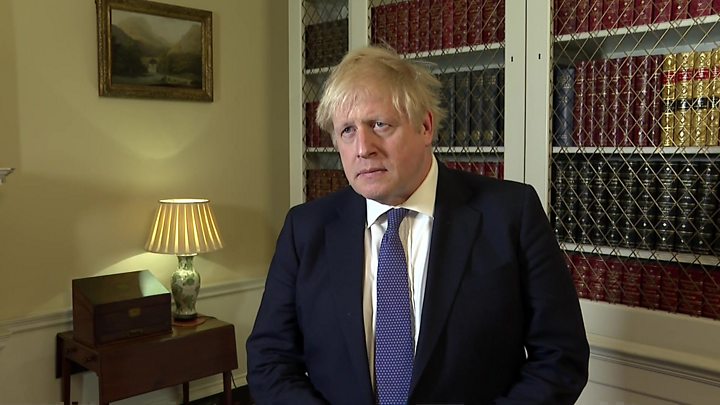LONDON — An extraordinary public row broke out in Prime Minister Boris Johnson’s new government on Saturday, with a top civil servant quitting amid allegations that he was bullied and mistreated by one of Mr. Johnson’s closest political allies.
The official who quit, Philip Rutnam, was the permanent secretary of the Home Office. He said that Home Secretary Priti Patel had carried out a “vicious and orchestrated” campaign to discredit him and undermine his authority as the ranking career official in the ministry, which oversees law enforcement and immigration.
Mr. Rutnam, a 33-year veteran of the government, said he had clashed repeatedly with Ms. Patel over her management of the Home Office, one of the most powerful ministries in the British government, whose immigration responsibilities give it a major role in shaping Britain’s departure from the European Union.
“I have received allegations that her conduct has included shouting and swearing, belittling people, making unreasonable and repeated demands — behavior that created fear and that needed some bravery to call out,” Mr. Rutnam said, reading an emotional statement before television cameras.

Mr. Rutnam said he believed his treatment was part of a wider pattern of abusive behavior in the government, which has been in a state of near-constant personnel upheaval since Mr. Johnson’s Conservative Party won a commanding majority in Parliament in last December’s general election.
Earlier in February, the government’s top finance minister, Sajid Javid, resigned rather than accept a demand from the prime minister to cut loose his senior aides. Mr. Johnson’s influential political adviser, Dominic Cummings, has moved ruthlessly to remove officials he views as obstacles to Mr. Johnson’s agenda.
Career civil servants like Mr. Rutnam play a powerful, behind-the-scenes role in running Britain’s government. Often schooled at Oxford or Cambridge and studiously nonpartisan, they serve Labour and Conservative governments alike. But Mr. Cummings has made no secret of his belief that Mr. Johnson needs more “weirdos and misfits” and fewer Oxbridge-educated Mandarins.
Most of this housecleaning is going on behind closed doors, the subject of water-cooler gossip or anonymously sourced articles in newspapers. But with Mr. Rutnam’s bitter resignation — in which he accused Ms. Patel of lying — the tensions in Mr. Johnson’s government have spilled into public view.
Analysts said they could not recall a career civil servant quitting in such a spectacle.
Opposition Labour Party officials said the resignation laid bare the government’s drive to stamp out any internal dissent. Jon Trickett, the party’s spokesman on civil service questions, said on Twitter that it showed “the underlying right-wing authoritarian but incompetent nature of the Johnson government.”
The dispute calls into question the future of Ms. Patel, a hard-line Brexiteer who is known for her tough talk on crime and immigration, and for her skepticism about the merits of foreign aid. The daughter of Indian immigrants who came to Britain via Uganda, she is close to Mr. Johnson and has emerged as perhaps the most powerful woman in his government.
But Ms. Patel has been a lightning rod for criticism throughout her career. In 2017, Mr. Johnson’s predecessor, Prime Minister Theresa May, dismissed her from the post of International Development secretary after she held unauthorized meetings with several Israeli officials, including Prime Minister Benjamin Netanyahu, during what was supposed to be a family visit to the country.
Ms. Patel did not immediately issue a statement on Saturday afternoon in response to Mr. Rutnam’s resignation. The head of the civil service, Cabinet Secretary Mark Sedwill, said in a terse statement to the BBC: “I have received and accepted with great regret the resignation of Sir Philip Rutnam. I think him for his long and dedicated career of public service.”
A graduate of Cambridge and Harvard, Mr. Rutnam previously held positions in the Treasury and the Department of Transport. In 2018, he was appointed a Knight Commander of the Order of the Bath, which added a Sir to his name.
Mr. Rutnam acknowledged that Mr. Sedwill had offered him a financial settlement to leave quietly. But Mr. Rutnam said that he planned instead to sue the Home Office for “constructive dismissal,” a legal term for being forced out of a job. That raised the prospect of public legal hearings that could air further embarrassing details about Ms. Patel’s treatment of her staff.
Mr. Rutnam’s statement already offered plenty of grist for her critics. He said he did not believe Ms. Patel’s denials that she had orchestrated a whispering campaign against him with the news media. Despite their falling out, Mr. Rutnam said, he had tried to reconcile with her at the request of Mr. Sedwill and the prime minister. Ms. Patel, he said, refused to engage with him.
Fighting back tears, Mr. Rutnam said, “This has been a very difficult decision, but I hope that my stand may help in maintaining the quality of government in our country, which includes hundreds of thousands of civil servants, loyally dedicated to delivering this government’s agenda.”
https://news.google.com/__i/rss/rd/articles/CBMiTmh0dHBzOi8vd3d3Lm55dGltZXMuY29tLzIwMjAvMDIvMjkvd29ybGQvZXVyb3BlL3ByaXRpLXBhdGVsLXBoaWxpcC1ydXRuYW0uaHRtbNIBUmh0dHBzOi8vd3d3Lm55dGltZXMuY29tLzIwMjAvMDIvMjkvd29ybGQvZXVyb3BlL3ByaXRpLXBhdGVsLXBoaWxpcC1ydXRuYW0uYW1wLmh0bWw?oc=5
2020-02-29 15:09:00Z
CAIiEMVR_AgTnI2bsKLB-QD5ijMqFwgEKg8IACoHCAowjuuKAzCWrzww5oEY

